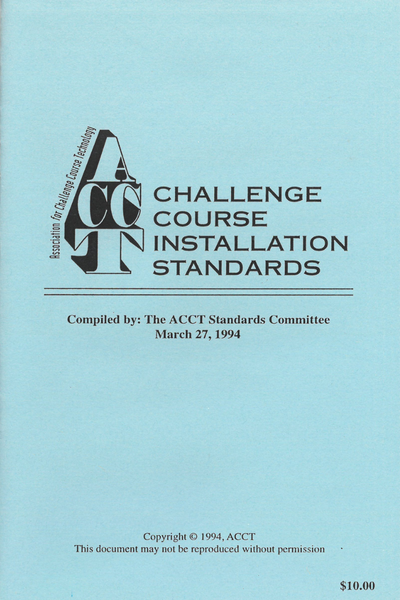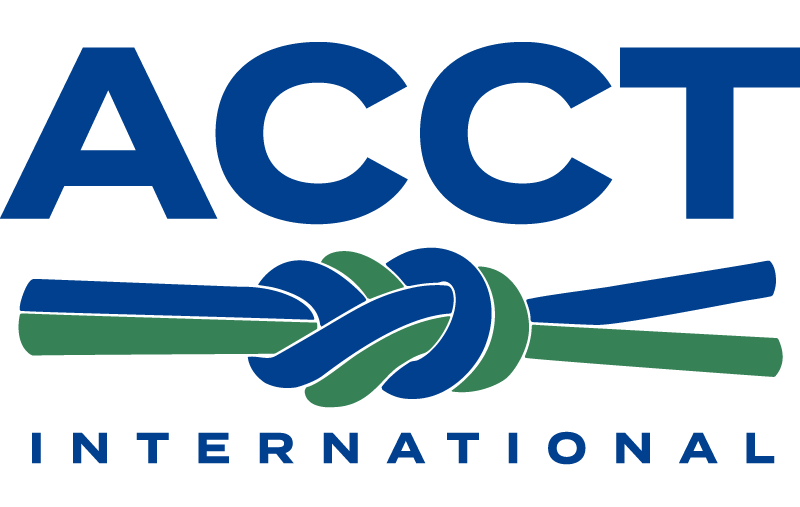History of ACCT Standards
 Significant growth in the challenge course field prompted a group of challenge course builders to gather in the spring of 1988 at a symposium in North Carolina. This early effort led to additional annual gatherings and eventually to the formation of ACCT in the summer of 1993. The use of the challenge course had worked its way into mainstream arenas in education, corporate training, mental health and human services, and the criminal justice system. With the proliferation of courses, an increasing need had arisen to provide standards that better defined safe construction and operations. The standards continued to be refined and later included practitioner certification.
Significant growth in the challenge course field prompted a group of challenge course builders to gather in the spring of 1988 at a symposium in North Carolina. This early effort led to additional annual gatherings and eventually to the formation of ACCT in the summer of 1993. The use of the challenge course had worked its way into mainstream arenas in education, corporate training, mental health and human services, and the criminal justice system. With the proliferation of courses, an increasing need had arisen to provide standards that better defined safe construction and operations. The standards continued to be refined and later included practitioner certification.
An Installation Standards Committee was formed during the 1991 Symposium to look at the issue of industry-wide installation standards. A first draft of these standards was completed and presented at the 1993 Symposium. Feedback on subsequent draft documents was collected and reviewed by the committee, resulting in the consensus standards adopted by the voting members of ACCT.
During later meetings, formal discussions took place regarding the increasing need to establish operational standards for challenge course professionals. A task force was formed out of these discussions, generating ideas and information about standards. ACCT then took on the challenge of developing a set of standards for the technical aspects of challenge course operations.
ACCT created an at-large committee representing a wide range of professionals throughout North America that contributed feedback and information. Considerable effort was made to include the input of as many experienced practitioners as possible in the process. The result of their work was the initial version of Technical Standards for Challenge Course Operations, which later evolved into the operations standards, covering not only technical skills but also broader aspects of the field.
In 2006, ACCT received notification of accreditation from ANSI as an Accredited Standards Developer. In January 2016, ACCT received notification from ANSI that ANSI/ACCT 03-2016 received final approval from the ANSI Board of Standards Review (BSR).
Numerous individuals have participated in ACCT volunteer groups over the years, contributing to the development and refinement of the standards. These volunteer groups continue to play a crucial role in supporting ACCT's mission by maintaining, revising, and creating standards.
ACCT Standards have been developed and are being continually updated with the global industry in mind. These standards are in use in many countries, always in alignment with local regulations and other local considerations. Other associations that operate in a specific geographical area have sometimes chosen to adopt and adapt the ACCT Standards for use in their own environment.
ACCT continues to review and revise the standards, to incorporate new information, and expand upon existing knowledge.
TIMELINE FOR STANDARDS DEVELOPMENT
| Year | Event |
|---|---|
| 1994 | ACCT publishes ACCT Challenge Course Installation Standards, First Edition |
| 1998 | ACCT publishes ACCT Challenge Course Standards, Second Edition Includes the first published set of Technical Standards for Challenge Course Operations |
| 1999 | ACCT publishes ACCT Challenge Course Standards, Third Edition Published as an addendum to the Second Edition; it adds Inspection Standards |
| 2001 | ACCT publishes ACCT Challenge Course Standards, Fourth Edition |
| 2002 | ACCT publishes ACCT Challenge Course Standards, Fifth Edition |
| 2004 | ACCT publishes ACCT Challenge Course Standards, Sixth Edition Significantly expands Challenge Course Operations Standards |
| 2006 | ACCT becomes an ANSI Accredited Standards Developer (ASD) |
| 2007 | ACCT publishes Addendum to the ACCT Challenge Course Standards, Sixth Edition Practitioner Certification Standards are appended |
| 2008 | ACCT publishes ACCT Challenge Course and Canopy/Zip Line Tour Standards, Seventh Edition Includes Qualified Challenge Course Professional Standards |
| 2012 | ACCT publishes ACCT Challenge Course and Canopy/Zip Line Tour Standards, Eighth Edition Qualified Challenge Course Professional Standards are removed. |
| 2016 | ACCT publishes ANSI/ACCT 03-2016 Challenge Courses and Canopy/Zip Line Tours Standards |
| 2019 | ACCT publishes, ANSI/ACCT 03-2019 Challenge Courses and Canopy/Zip Line Tours Standards (Revision of ANSI/ACCT 03-2016) Practitioner Certification Standards are no longer appended. |
| 2025 | ACCT initiates a revision to ANSI/ACCT 03-2019 |
PURCHASE ACCT STANDARDS
ACCT MEMBERS
A digital license for the current American National Standard is available to ACCT Members as a member benefit. The benefit is extended to sub-accounts of organizational members.
NON-MEMBERS
Purchase digital and print versions of the current American National Standard, and some older versions are available at the ACCT store.
RESOURCES
NEXT STEPS
ACCT STANDARDS DEVELOPMENT RESOURCES
- ACCT’s Standards Development Process. Learn more about ACCT’s ACCT Standards Development Process. Digital resources, answers to Frequently Asked Questions (FAQs), and information to help you learn when and how to get involved.
- Current ANS Development Project. Learn more about ACCT’s current Standards projects.
- ACCT Board of Directors. View roster, upcoming meetings, ACCT guiding documents, and minutes from previous meetings; register to attend an upcoming Board Meeting.
- ACCT Consensus Body. View roster of the ACCT Consensus Body, view meeting schedule and minutes, register to observe a meeting, and apply to be a Consensus Body Member.
- ACCT Accredited Procedures. Download Procedures for Organization, Development, and Maintenance of Challenge Course Standards by the Association for Challenge Course Technology (ACCT), ACCT’s governing document for ANS Development.
- Frequently Asked Questions. A collection of the Standards FAQs from the pages in this section.
- ANSI Essential Requirements. View and download ANSI Essential Requirements.
- Understanding Standards Development Definitions and Acronyms. A guide to understanding common terminology, abbreviations, and acronyms found in the Standards Development Process.
- Contact the ASD. Submit requests for official interpretation, comments on a draft project, ideas for projects or revisions, and unsolicited feedback, suggestions, or errata.
